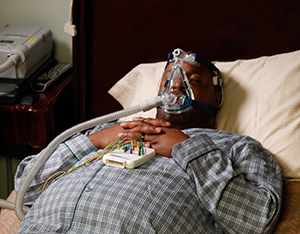Visiting a Sleep Clinic
Are you worried about having a sleep study? Know that the test is painless. Talk with your healthcare provider if you have any concerns. Learn what to expect at the sleep clinic so you are not surprised by anything when you arrive.
Before your study
Your healthcare provider will tell you how to prepare. Ask if you should take your usual medicines. Also:
-
Don't nap.
-
Don't use caffeine and alcohol.
-
Take a shower and wash your hair (don’t use hair conditioner, hair spray, and skin lotions).
-
Eat dinner before you come to the sleep clinic. Pack a snack if you need one before bedtime.
-
Bring what will make you comfortable, such as your pajamas, robe, slippers, hygiene items, and even your own pillow.
What you can expect
When you arrive at the sleep clinic, you will usually be checked in by a receptionist. A specialized sleep technologist will meet you in your room. Then, you may change into your pajamas. Small sensors are placed on your head and body with tape and gel. The sensors are then plugged into a machine that will monitor your sleep. If you need to use a restroom, the sensors can be unplugged. A camera in your room will record your body movements. The technologist will stay in a nearby room. If you need to talk to them, use the intercom.

What a sleep study does
A sleep study monitors all the stages of your sleep. To do this, the following are recorded:
-
Eye movements
-
Heart rate, brain waves, and muscle activity
-
Level of oxygen in your blood
-
Breathing and snoring
-
Sudden leg or body movements
If you have breathing problems, Continuous Positive Airway Pressure (CPAP) may be used. CPAP is a device that improves your sleep by helping you breathe. It adds mild air pressure to keep your airway passages open during sleep. CPAP may be needed in someone with sleep apnea. It may be used during the second half of your study or on another night.
Getting your results
The sleep technologist can answer some of your questions about the sleep study itself. Your healthcare provider will explain the results and discuss your treatment options with you. They will have the report of your sleep study within 1 to 2 weeks.
Online Medical Reviewer:
Andrew D Schriber MD
Online Medical Reviewer:
Jessica Gotwals RN BSN MPH
Online Medical Reviewer:
Marianne Fraser MSN RN
Date Last Reviewed:
5/1/2022
© 2000-2024 The StayWell Company, LLC. All rights reserved. This information is not intended as a substitute for professional medical care. Always follow your healthcare professional's instructions.